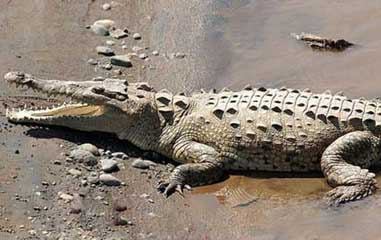Crocodile’s blood bypasses lungs to boost digestion
 Sydney, February 11: Crocodiles and alligators’ consume such a heavy
Sydney, February 11: Crocodiles and alligators’ consume such a heavy
meal in one sitting that they require diverting gas-rich blood away
from their lungs into their stomachs to digest it, say US researchers.
C. G. Farmer, an assistant professor of biology at the University of
Utah, says that a study of American alligators suggests that they can
eat 23 per cent of their own mass at once. She believes that the
finding is applicable to all crocodilians.
The researcher says that the study also appears to have solved the
mystery as to why alligators and crocodiles often find a warm place to
quietly recline after consuming a huge meal.
Farmer says that, though this behaviour of crocodilians seems quite
sedate, an extraordinary activity remains active inside their body.
During the study, she and her colleagues focussed on the extra left
aorta that crocodilians have on the side of their otherwise very
mammal-like hearts.
Normally, blood pumped by the right side of the heart flows through the
reptile's pulmonary artery into the lungs, where a transfer of carbon
dioxide occurs. However, this blood is shunted to the stomach when a
crocodile or alligator gorges, say the researchers.
The carbon dioxide then gets converted into gastric acid, a digestive
juice, and bicarbonate, which in turn function as a kind of antacid for
the reptile, they add.
Farmer says crocodilians produce 10 times more digestive juice than the
highest rates measured in mammals. Without this, she says, the enormous
quantity of food they eat would rot in their guts.
She says that if conditions are warm to support fluid flow in
crocodilians, digestion can take 10 to 20 days, and mostly eliminate
the possibility of rotten food.
James Hicks, a University of California at Irvine professor of ecology
and evolutionary biology whose laboratory is studying crocodilian
circulation, says that the two most common theories are that the
process contributes "to the croc's capacity for extended, underwater
dives" and that it helps with digestion.
"Dr Farmer's paper provides the first experimental test and supporting
evidence for one of these hypotheses," ABC Online quoted him as telling
Discovery News.
However impressive crocodilian digestion is, says Farmer, they just cannot stomach hair.
"They can't digest hair. The hair of their prey forms small pellets, and these are regurgitated," Farmer says. (ANI)